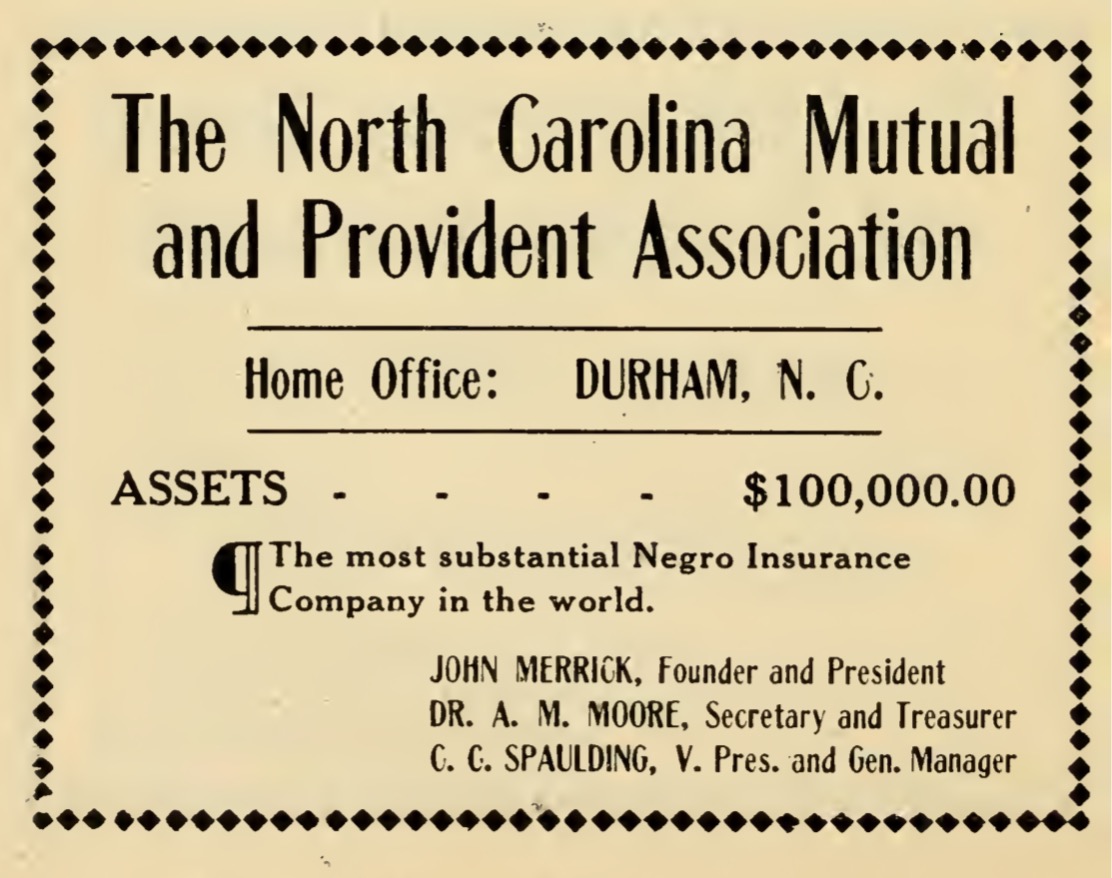Black Wall Street
Business is Booming
By Sarajanee Davis and Kelly Agan, N.C. Government & Heritage Library, 2020
Where do you and your family shop for food and supplies? Can you imagine a time when there was no online shopping? Or when people could not go to one store for everything?
online shopping? Or when people could not go to one store for everything?
In the late 1800s and early 1900s, skin color also determined where people could and would shop. Laws and discrimination made it difficult for African Americans to succeed in business. And it made it difficult for them to shop where they wanted.
Durham, North Carolina was a little different for a while. In Durham, African American business grew and thrived for many years. Parrish Street became the site of a strong and prosperous black-owned business district. The Hayti neighborhood, located next to Parrish Street, shared the prosperity. It had many black-owned businesses and homes.
 The Parrish Street area is now known as Black Wall Street. It was home to many different Black-owned businesses. The area received the name in the 1950s. It was a reference to its success and Wall Street, in New York City. Wall Street is the center of New York's financial district and the American stock market.
The Parrish Street area is now known as Black Wall Street. It was home to many different Black-owned businesses. The area received the name in the 1950s. It was a reference to its success and Wall Street, in New York City. Wall Street is the center of New York's financial district and the American stock market.
Durham's North Carolina Mutual Life Insurance Company was a black-owned business. It was started by John H. Merrick and Aaron M. Moore in 1898. Charles C. Spaulding joined them a few years later. And they moved the company to the center of Parrish Street in 1904. The company grew into one of North Carolina's most successful businesses. It was the first black-owned insurance business in the state and the largest in the United States. Eventually, North Carolina Mutual bought the Mechanics and Farmers Bank. It was another black-owned business started in 1907 and on Parrish Street. John Merrick, Aaron Moore, and C.C. Spaulding helped the district grow. In 1908, Aaron Moore, who was also a doctor, helped open a drug store on Parrish street. It was called the Bull City Drug Store.
These businesses made up Black Wall Street. They supported and helped African Americans with their services. And they invested in other black-owned businesses in Durham and the Hayti neighborhood. Other businesses included doctors and dentists, lawyers, newspapers, and grocers. At those businesses, African Americans could buy groceries, clothes, furniture, and household supplies. They could also find any services they wanted like a barber or a tailor.
For decades these businesses provided vital services to Durham’s African American community. Desegregation and the construction of NC Highway 147 devastated the Black business district. Yet, in 2003 the state placed a marker on Parrish Street to honor the vibrant center for small businesses. Today community leaders hope more small business owners will return to the neighborhood.
What kind of businesses do you think your community needs? How can you and your classmates support local businesses today?
References:
Brown, Leslie. Upbuilding Black Durham: Gender, Class, and Black Community Development in the Jim Crow South (Chapel Hill: The University of North Carolina Press, 2009).
Harriot, Michael. “The Other Black Wall Streets.” The Root. February 15, 2018. https://www.theroot.com/the-other-black-wall-streets-1823010812
Weare, Walter B. Black Business in the New South: A Social History of the North Carolina Mutual Life Insurance Company (Durham: Duke University Press, 1993).
Additional Resources
Barfield, Rodney and John Ansley. “North Carolina Mutual Life Insurance Company.” NC Pedia. 2006. https://www.ncpedia.org/north-carolina-mutual-life-insuranc (Accessed December 12, 2019).
“Black Wall Street-Durham,” UNC-TV, productions, April 16, 2019, https://www.pbs.org/video/black-wall-street-durham-4bzfny/.
Mangus, Amanda, Dana Terry, and Frank Stasio. “The Past, Present, And Future of Durham’s Black Wall Street.” WUNC 91.5 North Carolina Public Radio, June 7, 2019. https://www.wunc.org/show/the-state-of-things/2019-06-07/the-past-present-and-future-of-durhams-black-wall-street.
Straham, Ashley. “Durham’s Black-led Entrepreneurship: Black Wall Street Today.” Discover Durham, February 6, 2019. https://www.discoverdurham.com/blog/durham-history-black-owned-business/
"Black Wall Street." Photograph. North Carolina Highway Historical Marker Program. 2003. http://www.ncmarkers.com/Markers.aspx?MarkerId=G-116
Image Credits:
Seaman Printery. "Seeman's Durham (North Carolina) Directory [1911-1912]. https://lib.digitalnc.org/record/25144?ln=en
"Home Office Building, Owned by North Carolina Mutual Life Insurance Company, Durham, N.C." O052;032-0024, North Carolina Postcards, North Carolina Collection Photographic Archives, Wilson Library, University of North Carolina. https://dc.lib.unc.edu/cdm/ref/collection/nc_post/id/9897
9 January 2020 | Agan, Kelly; Davis, Sarajanee